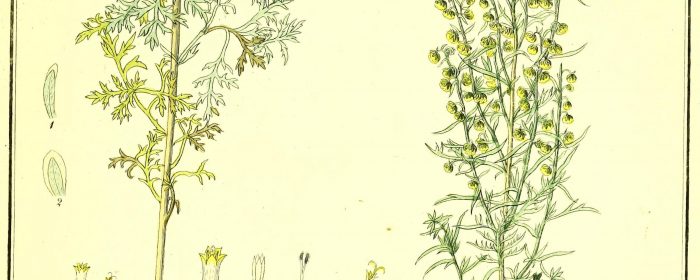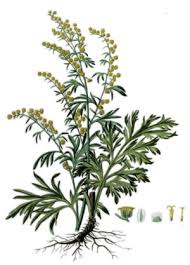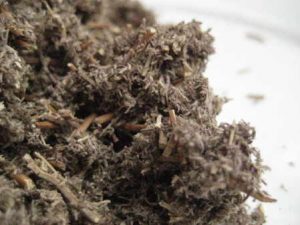
Roman Wormwood – Artemisia pontica
Artemisia pontica, the Roman Wormwood or Small Absinthe, is a lesser known cousin of Grand Wormwood and the preferred herb used in the production of absinthe and vermouth. Originating in southeastern Europe (the specific name refers to the Pontus area on the shores of the Black Sea).
It is naturalised over much of Eurasia from France to Xinjiang, and is also found in the wild in northeastern North America.
It is called Little or Small Absinthe because it is smaller in stature and leaf than the Grand Absinthe (Artemisia absinthium) also known as Grand Wormwood.
It grows as a rhizomatous perennial with erect stems up to 100 centimetres tall; the grey foliage is finely divided and aromatic. The flowers are small, yellowish, and appear in loose panicles at stem tips.
The essential oil from the plant contains cineol, camphor, thujone, and borneol among other components. It is said to be less bitter than great absinthe and is the principal flavouring of vermouth. It is commercially cultivated in Spain and Lithuania.
Usage for Wormwood:-
It is an ingredient in absinthe, which contrary to popular belief was never banned in the UK during la Belle Epoch although it was throughout the rest of Europe until the recipe changed. It is still used for flavouring in some other spirits and wines which include the bitters, vermouth and pelinkovac.
In the Middle Ages, it was used to spice mead, a honeyed wine, and in Morocco it is still used as tea which we heartily recommend as a digestive.
In 18th century England, wormwood was sometimes used instead of the better known hop in beer manufacturing.
A handful of Lavender, Wormwood and Rosemary stuffed in an old sock is an effective deterrant to moths in a wardrobe. Refresh by squeezing occasionally and wetting with some kind of spirit to release the essential oils.
Its traditional use has been claimed to remedy indigestion and gastric pain, and it acts as an antiseptic, and as a febrifuge.
Etymology
The word “wormwood” comes from Middle English “wormwode” or “wermode”. The form “wormwood” is influenced by the traditional use as a cure for intestinal worms. Webster’s Third New International Dictionary attributes the etymology to Old English “wermōd” (compare with German Wermut and the derived drink Vermouth). An alternate explanation dubiously combines the Old English “wer”, meaning “man” (as in “werewolf”), with OE “mōd”, meaning “mood”.
Buy Now


